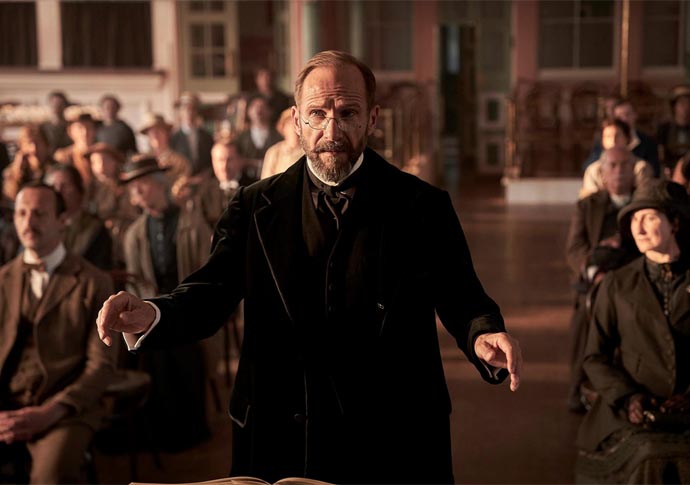The Choral: scattergun wartime storytelling misfires
Ralph Fiennes stars as a reluctant musical director in a fictional Yorkshire milltown
Friday, 7th November 2025 — By Dan Carrier

Ralph Fiennes in The Choral [Sony Pictures]
THE CHORAL
Directed by Nicholas Hytner
Certificate: 12a
☆☆☆
THIS Nicholas Hytner and Alan Bennett offering draws on the wartime idea that in the midst of man’s inhumanity to man, finding reasons for life to continue is socially vital.
The Choral takes place in 1916 in the fictional Yorkshire milltown of Ramsden, where the chimneys spew smoke out to a bucolic backdrop of the Dales – a stark contrast.
Ramsden has a well-established choral society, but the war has taken away many voices.
Still, mill owner and choral committee chairman (Roger Allam) says the show must go on – the Dales need the glory of music more than ever.
Dr Henry Guthrie (Ralph Fiennes) is earning a despondent living playing piano in a hotel lounge.
We learn he is a Germanophile, and was forced to return to Blighty by the war.
To him, Germany is the land of Bach and Beethoven, a place of high culture, not the devilish Hun committing war atrocities. Added to this, he has left his German boyfriend behind, and is desperately worried about his partner’s safety.
He is reluctantly appointed as musical director – time spent in Germany sets him at odds with a community mourning deaths at the Western Front – and with German composers out, Dr Guthrie decides on Sir Edward Elgar’s The Dream of Gerontius.
A tangled thread of tales includes 17-year-old telegram boy Lofty (Oliver Briscombe), who delivers bad news each day. Ellis (Taylor Uttley), thinks joining the chorus will increase his chances of losing his virginity before being sent to France. Mary (Amara Okereke), is a Salvation Army devotee who attracts their attention, as does Bella (Emily Fairn), whose boyfriend is missing in France.
Watching a Bennett / Hytner collaboration is like settling down into a horsehair armchair, slipping your feet into a pair of Cotswold lamb slippers, sipping on a mug of Bourneville hot chocolate and listening to Test Match Special while doing The Times cryptic crossword.
It is the filmatic equivalent of reading George Orwell’s seminal wartime essay, The Lion and the Unicorn, with its warm beer and maids cycling in through the mist.
Like a high-brow Ealing Comedy, it slots neatly into the Bennett / Hytner canon of The Madness of King George, The History Boys and The Lady in the Van, but its scattergun storytelling means it lacks the dramatic punch of their earlier offerings.